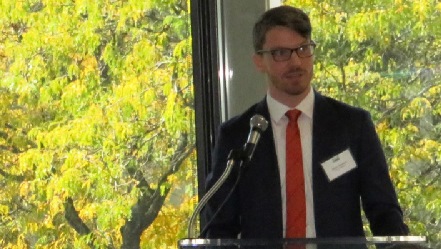
The same day that President M. Roy Wilson and Dean Jack D. Sobel, M.D., were notified that the Wayne State University School of Medicine is fully accredited through academic year 2022-2023 by the Liaison Committee on Medical Education, Class of 2019 M.D. candidate Brian Sullivan delivered an impactful speech about the student role in the successful LCME process and how program assessments like it have contributed to his success as a WSU medical student.
Sullivan spoke at President Wilson's Recognition Luncheon, held Oct. 19 and hosted at the McGregor Memorial Conference Center by the University Assessment Council, WSU Provost Keith Whitfield, Ph.D., and President Wilson. Sullivan is the first student invited to speak since the luncheon's inception three years ago.
Guests included active leaders from schools and colleges across campus that use assessment practices to improve student learning and success.
Sullivan, invited by Vice Dean of Medical Education Richard Baker, M.D., became a member of the School of Medicine's LCME Steering Committee during his first year of medical school.
"In a bold move, students were asked to take ownership of the organization at every level. We were asked to characterize deficiencies as we saw them, using quantifiable methods, and implement our own solutions. We, the students, re-wrote organizational charts and charters and constitutions to solidify new student roles and responsibilities. We reached out to neighboring schools, traveled to educational conferences and changed the program to fit our needs in real time," he said.
Halfway through the academic year, students were evaluating one another, selecting new course resources, redesigning grading systems, altering study spaces, and aiding in hiring new faculty and administrators, and in selecting future classmates.
"To demonstrate how significant and how rapid these changes were felt: The Class of 2019, my class, recently wrote its first board exams with the highest pass rate and highest average score of any class before it. In one year, the School of Medicine has produced its most diverse incoming class ever, and applications to the school have increased by 40 percent," Sullivan told the crowd.
Sullivan was invited to speak by WSU Director of Assessment Catherine Barrette, Ph.D., on the recommendation of School of Medicine Assistant Dean of Continuous Quality Improvement and Compliance Jason Booza, Ph.D.
His speech, Dr. Barrette said, demonstrated that engaging students in assessment provides a multitude of advantages for student learning, and student professional development and leadership opportunities, and for program faculty, staff and administrators, who gain insights into student learning needs, creating better programs that can enhance reputation, recruitment, retention and graduation efforts.
"For these reasons, promoting student involvement in the planning and use of program assessment data is one of my office's and the University Assessment Council's goals for continuing to develop best practices in assessment at Wayne State," Dr. Barrette said.
Student participation in assessment and planning brings what Sullivan called "intangibles," giving the institution transparency and accountability. He and his fellow students - nearly 300 per four class years - can now measure increased buy-in to the school's curriculum revision, better self-directed learning and increased professionalism, and bring the phrase "learner-centric" to life, he added.
"Several people, myself included, said they found his speech inspirational and thought-provoking, leading them to consider how to bring student perspectives into more areas of decision making in their programs," Barrette said.
Sullivan closed by offering his advice on how others can repeat the turnaround success of the School of Medicine, recommending a robust peer-elected student government, an organized method for changing course materials and lecture formatting year to year, invited participation in town halls after each course to float grievances and freely share ideas with peers, and, importantly, allowing students to elect representatives onto all operational committees within the institutions of WSU.
"Student votes should be substantial, not accessory, amounting to a significant percentage of the total voting power," he said.
For more information about program assessment at WSU, visit https://wayne.edu/assessment.